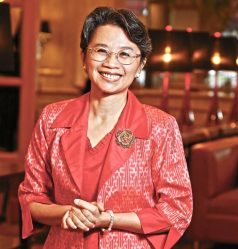
Ambassador/Permanent Representative of Thailand to ASEAN, Phasporn Sangasubana, talks to Vietnam News Agency about the results of the 37th ASEAN Summit
How do you evaluate the results of the 37th ASEAN Summit and related meetings? What messages and commitments did Thailand convey?
The 37th ASEAN Summit and related meetings concluded on a high note, showing the wider region and the world that the COVID-19 pandemic could neither derail our commitments nor delay our plans. In fact, the pandemic has pushed us to work harder and together more closely than ever, to ensure that our region can navigate through this difficult time and emerge stronger from this crisis.
During the meetings among ASEAN member states and with their dialogue partners, General Prayut Chan-o-cha, Prime Minister of the Kingdom of Thailand, highlighted the importance of public health co-operation, in particular on vaccine security, and the need to promote regional stability that is conducive to economic recovery. He also reiterated Thailand’s commitment to strengthen co-operation with other ASEAN member states and relevant partners to enhance human security, including in the areas of universal health coverage, human capital development, and sustainable development, in order to truly realise a people-centred ASEAN Community that leaves no one behind.
What were the most outstanding achievements of ASEAN in this very difficult year?
In order to cope with the spread of COVID-19 and alleviate its economic impacts as well as to build back better, ASEAN began working almost immediately after the detection of the first case of infection. Following the Special ASEAN Summit on COVID-19 and the Special ASEAN Plus Three Summit on COVID-19 on April 14, ASEAN set up the COVID-19 ASEAN Response Fund and the ASEAN Regional Reserve of Medical Supplies. We adopted the ASEAN Comprehensive Recovery Framework and its Implementation Plan, and most recently the ASEAN Declaration on an ASEAN Travel Corridor Arrangement Framework. We also established the ASEAN Centre for Public Health Emergencies and Emerging Diseases and finalised the ASEAN Strategic Framework on Public Health Emergencies.
ASEAN’s key performances this year were not limited to those related to COVID-19. The Regional Comprehensive Economic Partnership or RCEP was signed on November 15. It is now the largest free trade agreement and its early implementation can help increase strategic value for ASEAN in global trade and investment.
These achievements could not have been possible without the cohesive and responsive efforts from all ASEAN member states and the co-operative relations with our partners.
What does the signing of RCEP mean for ASEAN in the context of the global economic downturn caused by the COVID-19 pandemic? What does Thailand expect from this agreement?
The signing of RCEP will help mitigate the impacts of COVID-19 on ASEAN economies and accelerate our recovery. It also attests to ASEAN’s resolve to advance regional economic integration and commitment to a free and open multilateral trading system.
Thailand expects the RCEP to re-invigorate regional trade and investment, restore the much-needed business confidence, and demonstrate to the world that our market is ready to rebound.
How has Việt Nam performed as ASEAN Chair, especially in the challenging context of the COVID-19 pandemic and amid growing tension in the region?
Việt Nam, as the current Chair of ASEAN, has quickly adapted to the changing circumstances amidst the COVID-19 pandemic by conducting virtual, instead of face-to-face, meetings throughout the year. Not only has this ensured that important deliverables can be achieved according to plan, but also enabled ASEAN to continue engagement among ourselves and with partners.
Following the success of Việt Nam’s initiative to hold the ASEAN Summit on COVID-19 and the Special ASEAN Plus Three Summit on COVID-19, ASEAN has held a number of high-level meetings to exchange information and foster co-operation to address the pandemic, including with the EU, the US, Australia, and the UK.
What major challenges and opportunities face ASEAN in the coming years? Do you think that our region needs to continue to promote the spirit of 'cohesive and responsive' ASEAN?
The current global political economy presents a complex set of policy decisions for governments around the world. We have witnessed the intensifying tensions between major powers partly exacerbated by the pandemic. With the regional economy projected to contract by 3.8 per cent in 2020, it is important to preserve regional stability in order to create an environment conducive for tackling the COVID-19 pandemic and for economic recovery.
The pandemic has, unfortunately, reversed the progress towards achieving the SDGs. We, therefore, need to refocus our efforts and rechart our paths towards recovery.
The pandemic has also shown that digital technology is vital to living in this challenging present and building a stronger future. We should therefore enhance digital literacy and apply digital technology in such areas as education, communication, trade and investment while ensuring cybersecurity
Given this context, the spirit of 'cohesive and responsive' ASEAN is needed now more than ever. ASEAN needs to be cohesive and stand firm in its belief in multilateralism and regionalism while maintaining its centrality in the regional architecture with an emphasis on mutual trust, mutual benefits, and mutual respect. The ASEAN Outlook on the Indo- Pacific should be used as a tool to encourage major powers to constructively interact with ASEAN member states in order to promote the region’s sustainable socio-economic development. — VNS
Xem thêm: lmth.stluser-timmus-naesa-sesiarp-tamolpid-iaht/357708/swal-scitilop/nv.swenmanteiv